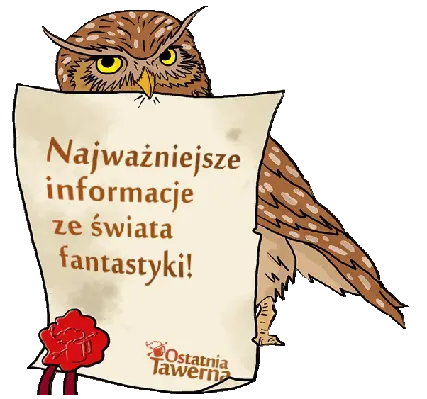Long ago, the Greek gods revolted and their father decided they had to be punished for it. This is how Agon was created – a kind of games during which everyone can try to become a new Dionysus or Athena. Every seven years, the members of the pantheon lose their immortality and face warlike volunteers desperate for power. In these realities also arose Lore, currently the last of the murdered Perseid family (House of Perseus). From an early age, the girl trained to take part in Agon, but international animosities made her give up these plans and hide among people’s unaware divine games. However, everything changed when the wounded Athena girl appeared on the doorstep of the house. The goddess dragged the teenager into the world from which she tried to escape.
No surprises
Loreis a one-volume story that presents us with a plot about gods and people. There is a lot of fights, chases, intrigues and, of course, envy, as well as a greedy thirst for power and immortality. It is quite difficult to enter these realities, because at the beginning we get a list of families, many names and situations that are seemingly unrelated to us at all. Understanding the main character is also quite crude, because her story and the whole outline of her character are terribly stretched and criss-crossed with many scenes of insignificant dialogues and escapes, or chases. After all, she is a girl with an interesting set of traits, but she is quite reckless in her decisions. In addition to Lore, we also meet her close friends – the boyfriend she lives with and her ex-sparring partner. The first of them is an extremely nice person who can be liked especially for his intelligence, loyalty and incredible courage. Castor, on the other hand (the second of the teenagers), tries to be a hero who I would describe as a law-abiding good – but at the same time he does not stand out with anything special. Of course, Greek gods also appear in the book. We learn the most about Athena, there is also some mention of Apollo and Artemis, and Hermes gets quite an interesting role. Fans of mythology, however, may feel a bit disappointed, because in fact the author neither showed us a new perspective on Olympus, nor did she create particularly innovative creations of the deities we know. Also, the ending of the story and what ultimately happens to the members of the pantheon is not satisfying. which can be liked especially for his intelligence, loyalty and incredible courage. Castor, on the other hand (the second of the teenagers), tries to be a hero who I would describe as a law-abiding good – but at the same time he does not stand out with anything special. Of course, Greek gods also appear in the book. We learn the most about Athena, there is also some mention of Apollo and Artemis, and Hermes gets quite an interesting role. Fans of mythology, however, may feel a bit disappointed, because in fact the author neither showed us a new perspective on Olympus, nor did she create particularly innovative creations of the deities we know. Also, the ending of the story and what ultimately happens to the members of the pantheon is not satisfying. which can be liked especially for his intelligence, loyalty and incredible courage. Castor, on the other hand (the second of the teenagers), tries to be a hero who I would describe as a law-abiding good – but at the same time he does not stand out with anything special. Of course, Greek gods also appear in the book. We learn the most about Athena, there is also some mention of Apollo and Artemis, and Hermes gets quite an interesting role. Fans of mythology, however, may feel a bit disappointed, because in fact the author neither showed us a new perspective on Olympus, nor did she create particularly innovative creations of the deities we know. Also, the ending of the story and what ultimately happens to the members of the pantheon is not satisfying. Castor, on the other hand (the second of the teenagers), tries to be a hero who I would describe as a law-abiding good – but at the same time he does not stand out with anything special. Of course, Greek gods also appear in the book. We learn the most about Athena, there is also some mention of Apollo and Artemis, and Hermes gets quite an interesting role. Fans of mythology, however, may feel a bit disappointed, because in fact the author neither showed us a new perspective on Olympus, nor did she create particularly innovative creations of the deities we know. Also, the ending of the story and what ultimately happens to the members of the pantheon is not satisfying. Castor, on the other hand (the second of the teenagers), tries to be a hero who I would describe as a law-abiding good – but at the same time he does not stand out with anything special. Of course, Greek gods also appear in the book. We learn the most about Athena, there is also some mention of Apollo and Artemis, and Hermes gets quite an interesting role. Fans of mythology, however, may feel a bit disappointed, because in fact the author neither showed us a new perspective on Olympus, nor did she create particularly innovative creations of the deities we know. Also, the ending of the story and what ultimately happens to the members of the pantheon is not satisfying. We learn the most about Athena, there is also some mention of Apollo and Artemis, and Hermes gets quite an interesting role. Fans of mythology, however, may feel a bit disappointed, because in fact the author neither showed us a new perspective on Olympus, nor did she create particularly innovative creations of the deities we know. Also, the ending of the story and what ultimately happens to the members of the pantheon is not satisfying. We learn the most about Athena, there is also some mention of Apollo and Artemis, and Hermes gets quite an interesting role. Fans of mythology, however, may feel a bit disappointed, because in fact the author neither showed us a new perspective on Olympus, nor did she create particularly innovative creations of the deities we know. Also, the ending of the story and what ultimately happens to the members of the pantheon is not satisfying.
Fight to… read every page
Reading LoreMany times I had the impression that whether they are characters or action scenes, they do not have any specific depth. The author did not create interesting enough heroes to sympathize with or hate them. The main opponent has fairly fluid motivations for his actions, and Agon itself is just a brawl. The main plot, i.e. the desire to end the games that take place every seven years, is sewn with a bit of thick threads. The motivations, be they warriors or primal deities, are very shallow, while the relationships between the characters have no chemistry (Lore and her girlfriends receive my private title as the most rigid book pair of the month). The author also did not explain meaningfully the connection between the normal world known to us and the mythological one (the families of warriors and their functioning looked to me like such small sects, not like groups that respect their traditions). It is unbelievable, for example, that nobody was affected by all the sudden destruction caused by the fighting. This publication is also very well-known at times, and what is happening does not add much to the plot. The writer did not manage to properly balance the number of scenes with the action and the calmer ones, which makes the reading uneven and on the one hand makes us bored, and on the other hand, we do not understand what’s going on. I also don’t know what the drastic scenes, such as the torture of the Lore family, were aimed at. For a book for teenagers, I don’t see the point in such poor descriptions. The writer did not manage to properly balance the number of scenes with the action and the calmer ones, which makes the reading uneven and on the one hand makes us bored, and on the other hand, we do not understand what’s going on. I also don’t know what the drastic scenes, such as the torture of the Lore family, were aimed at. For a book for teenagers, I don’t see the point in such poor descriptions. The writer did not manage to properly balance the number of scenes with the action and the calmer ones, which makes the reading uneven and on the one hand makes us bored, and on the other hand, we do not understand what’s going on. I also don’t know what the drastic scenes, such as the torture of the Lore family, were aimed at. For a book for teenagers, I don’t see the point in such poor descriptions.
I prefer mythology according to Parandowski and the Hunger Games separately
I am not convinced of the new Bracken title. Too long, and at the same time without interestingly developed relationships and characters. Gore descriptions are distasteful, the characters do not arouse much feelings, and the ending itself is unsatisfactory. A book that I will definitely not return to.

